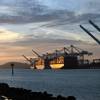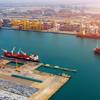Port City Plans for New Cargo Taxes Angers Kenya Govt, Shippers
Proposals by a local authority to impose new taxes on cargo at Kenya's main port has drawn opposition from the government and shippers, saying it will hike import prices and make the east African trade hub less competitive.
The government, keen to see off emerging competition from regional rivals, has been striving to improve efficiency at Mombasa port, the congested gateway that serves Kenya and landlocked states such as South Sudan, Uganda and Rwanda.
Customs reforms and other steps have cut transit times and costs, but government officials and shippers say such gains could be undermined if the local authority succeeds in imposing extra taxes using revenue-raising and other powers granted to Kenya's regions under a 2010 constitution.
The government says it will oppose any move to add new levies but the case will test Nairobi's ability to challenge local government decisions, if Mombasa County assembly votes as expected to approve the measures next week.
"The County can pass the bill if they wish, but the final say lies with the ministry," said John Mosonik, principal secretary at the Transport and Infrastructure Ministry.
"We are trying to improve the port and make it more efficient to attract more businessmen and revenue, and it would be unrealistic to even think of introducing new levies which would otherwise negate all these efforts," he told Reuters.
Mombasa Governor Ali Hassan Joho, who backs the proposed legislation, has said the port should be managed by the Mombasa County authorities and not central government, so its revenues can be used to improve services in the bustling city.
The draft bill on the new taxes includes proposals for a charge of $60 for ships with a gross tonnage of up to 1,000 tonnes and $300 for vessels of 30,000 tonnes or more.
Shipping firms would have to pay $20 per tonne of exports and $20 per tonne to clear imports. Each ship would also pay $60 for inspection, $60 per square metre for compulsory spraying against disease and $40 per container for verification.
"We already are focused on very essential strategies aimed at improving the port performance," said Danson Mungatana, the port chairman. "When such discussions over new taxes begin to emerge, they derail and drag these ambitious plans."
Based on the 22.3 million tonnes of cargo handled by the port in 2013, Mungata said a charge of $20 on each tonne in transit would mean extra costs totalling $446 million a year.
Shipping firms and importers have long grumbled about delays and high costs of moving cargo through Mombasa, but have had few alternatives till now. But that could change as Kenya's southern neighbour Tanzania upgrades its Dar es Salaam port and plans a brand new port on its coast to boost its role as a hub.
"We are already paying taxes to other bodies and cannot pay any extra, otherwise we will be forced to either increase the prices for imports and exports, or seek cheaper alternative ports within the region," said Juma Tellah, executive officer of the Kenya Shippers Council.
(By Joseph Akwiri; Editing by James Macharia, Edmund Blair and Crispian Balmer)











